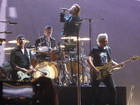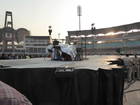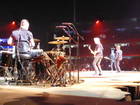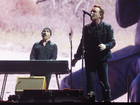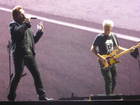U2 Elevation Tour
Elevation Tour 1st leg: North America
: First Union Center - Philadelphia, Pennsylvania, USA
U2 ends the artiness, goes for the galvanizing
Tom Moon (published on 2001-06-13)Source: The Inquirer
A stage encircled by a giant heart. A set saturated with rock-radio favorites, many unheard on recent stadium treks. A singer, almost on bended knee, confiding that his band has more to prove now than it did at its first U.S. performances 20 years ago.
Maybe U2 should have called this the Atonement Tour.
Monday at the First Union Center, at the first of two sold-out performances, U2 put its "experimental" phase in the rearview mirror, and returned to the thundering military drums, needlepoint guitars, and Bono's keening, indignant voice that galvanized rock and roll during its Joshua Tree heyday.
The group members entered with the house lights still on, took their positions, and began "Elevation," one of the more compelling pieces from All That You Can't Leave Behind, the album that allegedly makes U2 accessible again. The rhythm slurped and surged in a no-man's swamp between rock and funk, and by the time the lights went down halfway through, its repetitive guitar and bass phrases had aligned into a trance-inducing groove. All doubts about U2's continued ability to rouse the faithful were erased, at least for a minute, as the Dublin four-piece achieved a stirring, righteous fervor that few in pop even attempt anymore.
Next came the single "Beautiful Day," an extended crescendo in search of a song. Bono worked to make its dewy-eyed celebration of nature come alive with only intermittent success. The threadbare theme was exposed when, at the song's end, he began singing the more substantial Cole Porter standard "Night and Day." The accompaniment fell away, and there was Bono the Sinatra-worshiping crooner toying with tempo, spinning through the gorgeous melody as though auditioning at a jazz club.
That wasn't his only solo moment: Bono also did a gawky version of the Beatles' "In My Life," and appended bits of classic pop and rock to U2 songs. "Mysterious Ways" blossomed beautifully, then ended with a nod to Marvin Gaye's "Sexual Healing," while the Marley chant "Get Up, Stand Up" expanded the message of "Sunday Bloody Sunday." And the thrilling "Bad" inspired Bono to quote a bit of the Rolling Stones' "Wild Horses."
The band did everything possible to show it had learned from its '90s transgressions. There were none of the Popmart Tour's floating lemons, no fireworks. And though the visuals were spectacular - particularly the screens that showed a woman dancing in silhouette during "Mysterious Ways" and trippy lighting sequences of "Desire" - the whole presentation, even the heart-shaped ramp that jutted into the crowd, was minimal.
Somewhere in the middle of the set, after U2 had dispensed with its current album, Bono got on the soapbox to introduce "Stay (Faraway, So Close!)" from 1993's Zooropa. He explained that the song was from a "period when people say we got all arty on ya, got a little 'out there,' " and became a little defensive.
"I think we found some very interesting bits and pieces while we were out there," he said, sticking up for the band's '90s output.
This time Bono was right. With the help of Edge's trembling guitars, "Stay" became a bittersweet elegy, a rare moment of genuine subtlety. After that respite - the only selection from the so-called experimental era - U2 went back to its hammering hits in rapid succession. All were rendered competently, but the evening felt markedly different from previous outings. Even at its most grandiose, U2 has always been known for gathering its audience into what felt like a crusade. This time, even the faithful who stood from start to finish witnessed a performance rather than participated in it or helped push U2 up the mountain.
The show's most provocative moment came in the encore, which began with the crowd chanting "Beat L.A.!" Following a gun-control video that obliquely satirized NRA president Charlton Heston, the band returned with the spoken-word "Bullet the Blue Sky." During its closing verse, Bono shined a handheld spotlight into the crowd as he incorporated Oklahoma City bomber Timothy McVeigh into his anti-violence narrative. Here, at last, was classic U2: political commentary set to a thumping beat that doubled as riveting theater.
Often plagiarised, never matched.
